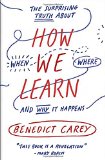Summary | Excerpt | Reviews | Beyond the Book | Readalikes | Genres & Themes | Author Bio

The Surprising Truth About When, Where, and Why It Happens
by Benedict CareyChapter One
The Story Maker
The Biology of Memory
The science of learning is, at bottom, a study of the mental muscle doing the work—the living brain—and how it manages the streaming sights, sounds, and scents of daily life. That it does so at all is miracle enough. That it does so routinely is beyond extraordinary.
Think of the waves of information rushing in every waking moment, the hiss of the kettle, the flicker of movement in the hall, the twinge of back pain, the tang of smoke. Then add the demands of a typical layer of multitasking—say, preparing a meal while monitoring a preschooler, periodically returning work emails, and picking up the phone to catch up with a friend.
Insane.
The machine that can do all that at once is more than merely complex. It's a cauldron of activity. It's churning like a kicked beehive.
Consider several numbers. The average human brain contains 100 billion neurons, the cells that make up its gray matter. Most of these cells link to thousands of other neurons, forming a universe of intertwining networks that communicate in a ceaseless, silent electrical storm with a storage capacity, in digital terms, of a million gigabytes. That's enough to hold three million TV shows. This biological machine hums along even when it's "at rest," staring blankly at the bird feeder or some island daydream, using about 90 percent of the energy it burns while doing a crossword puzzle. Parts of the brain are highly active during sleep, too.
The brain is a dark, mostly featureless planet, and it helps to have a map. A simple one will do, to start. The sketch below shows several areas that are central to learning: the entorhinal cortex, which acts as a kind of filter for incoming information; the hippocampus, where memory formation begins; and the neocortex, where conscious memories are stored once they're flagged as keepers.
This diagram is more than a snapshot. It hints at how the brain operates. The brain has modules, specialized components that divide the labor. The entorhinal cortex does one thing, and the hippocampus does another. The right hemisphere performs different functions from the left one. There are dedicated sensory areas, too, processing what you see, hear, and feel. Each does its own job and together they generate a coherent whole, a continually updating record of past, present, and possible future.
In a way, the brain's modules are like specialists in a movie production crew. The cinematographer is framing shots, zooming in tight, dropping back, stockpiling footage. The sound engineer is recording, fiddling with volume, filtering background noise. There are editors and writers, a graphics person, a prop stylist, a composer working to supply tone, feeling—the emotional content—as well as someone keeping the books, tracking invoices, the facts and figures. And there's a director, deciding which pieces go where, braiding all these elements together to tell a story that holds up. Not just any story, of course, but the one that best explains the "material" pouring through the senses. The brain interprets scenes in the instants after they happen, inserting judgments, meaning, and context on the fly. It also reconstructs them later on—what exactly did the boss mean by that comment?—scrutinizing the original footage to see how and where it fits into the larger movie.
It's a story of a life—our own private documentary—and the film "crew" serves as an animating metaphor for what's happening behind the scenes. How a memory forms. How it's retrieved. Why it seems to fade, change, or grow more lucid over time. And how we might manipulate each step, to make the details richer, more vivid, clearer.
Remember, the director of this documentary is not some film school graduate, or a Hollywood prince with an entourage. It's you.
Excerpted from How We Learn by Benedict Carey. Copyright © 2014 by Benedict Carey. Excerpted by permission of Random House, a division of Random House LLC. All rights reserved. No part of this excerpt may be reproduced or reprinted without permission in writing from the publisher.
Your guide toexceptional books
BookBrowse seeks out and recommends the best in contemporary fiction and nonfiction—books that not only engage and entertain but also deepen our understanding of ourselves and the world around us.